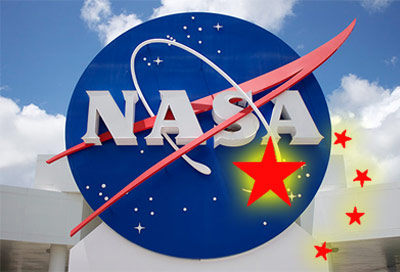(Fox News) NASA has locked its facilities to foreigners, disabled online research databases and ordered a complete review of access by foreign nationals to its facilities, as allegations swirled of foreign spies within the space agency.
The reports came to a head this weekend with the arrest of former consultant Bo Jiang as he was leaving the country with a one-way ticket to China — carrying several data storage devices, including hard drives, flash drives and computers that likely contained sensitive information.
In testimony Wednesday before Rep. Frank Wolf, R-Va., chairman of the House Appropriations subcommittee that funds the space agency, NASA chief Charles Bolden said associate administrator Robert Lightfoot would head a complete investigation into the issue. External investigations would likely follow.
“We don’t anticipate having a Chinese visitor to a NASA facility any time soon,” he said.
“I’ve ordered a complete review of the access that foreign nationals are granted at NASA facilities,” Bolden said. “Within a week we probably will ask [the National Academy of Public Administration] to do an external review,” he added.
Jiang was far from the only foreign national working in NASA facilities around the country. There are 281 foreign nationals with physical access to the agency’s facilities including 192 Chinese nationals, he said.
The number of U.S. citizens working in Chinese facilities?
“To my knowledge, we have no NASA personnel … who are working in the People’s Republic of China,” Bolden said.
In addition to the security review, Bolden announced that he had closed down a publicly available NASA technical reports database due to the risk of confidential information leaking out. A message on the site indicates that “until further notice, the NTRS system will be unavailable for public access. We … anticipate that this site will return to service in the near future.”
NASA also instigated a moratorium on access to NASA facilities and data from several foreign countries, including China, Burma, Eritrea, Saudi Arabia and Uzbekistan.
Remote computer access from those countries will be terminated as well, he added.
“This is about national security, not NASA security. And I take that seriously. I will hold myself accountable once the review is completed,” Bolden said. . . . (read more)
FBI investigating multiple NASA centers to counter growing space espionage threat (Washington Examiner)
Federal law enforcement officials are mounting anti-espionage investigations at multiple NASA facilities to counter what FBI Director Robert Mueller believes is a growing threat against U.S. space technology.
“If anything, I would say that the threat is – is more substantial than perhaps it was 10, 15 years ago,” Mueller said yesterday during a hearing of a subcommittee of the House Appropriations Committee that oversees both NASA and the FBI.
The subcommittee’s chairman if Rep. Frank Wolf, R-VA.
Mueller told Wolf’s panel that foreign nationals targeting NASA for espionage purposes are a “significant threat,” and disclosed for the first time that the bureau has “a number of investigations ongoing” at several facilities within the space agency. . . .
. . . . Mueller’s comments followed the weekend arrest by FBI agents at Dulles Airport of Bo Jiang, a Chinese National who was trying to board a one-way flight to China.
Jiang was employed as a scientist by the National Institute for Aerospace, a contractor at NASA’s Langley Research Center in Hampton, Va. Jiang was arraigned Tuesday in federal court.
The FBI is “investigating conspiracies and substantive violations of the Arms Export Control Act,” according to the FBI’s arrest warrant.
Jiang allegedly traveled to China in 2012 carrying “volumes” of sensitive NASA information.
His position with NIA afforded him virtually unlimited, unescorted access throughout the Langley facility, which houses significant satellite technology resources with military applications.
Congressional sources say NIA paid Jiang at least $200,000 in income. . . . (read more)
House Appropriations Committee – Commerce, Justice, Science, and Related Agencies
03.20.13 CJS – NASA – Charles Bolden – Testimony
03.19.13 CJS – FBI – Robert Mueller – Testimony
. . . While foreign intelligence services continue traditional efforts to target political and military intelligence, counterintelligence threats now include efforts to obtain technologies and trade secrets from corporations and universities.
The loss of critical research and development data, intellectual property, and insider information poses a significant threat to national security.
Each year, foreign intelligence services and their collectors become more creative and more sophisticated in their methods to steal innovative technology, which is often the key to America’s leading edge in business.
Last year alone, the FBI estimates that pending economic espionage cases cost the American economy more than $13 billion.
In the last four years, the number of arrests the FBI has made associated with economic espionage has doubled; indictments have increased five-fold; and convictions have risen eight-fold.
As the FBI’s economic espionage caseload is growing, the percentage of cases attributed to an insider threat has increased, meaning that individuals trusted as employees and contractors are a growing part of the problem.
The insider threat, of course, is not new, but it is becoming more prevalent for a host of reasons, including that:
- theft of company information is a low-cost route to avoid investment in research
- the ease of stealing information that is stored electronically, especially when one has legitimate access to it
- the increasing exposure of businesses to foreign intelligence services as joint ventures grow and businesses becomes more global.











